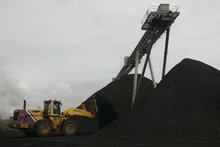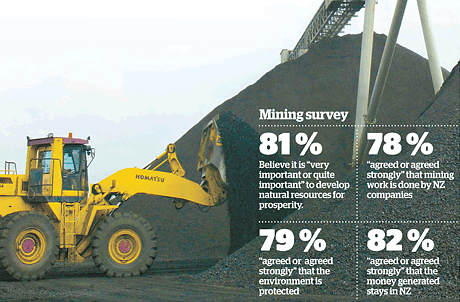
Mineral sector lobby group Straterra believes New Zealanders support mineral exploration and mining as an avenue towards economic prosperity, but is concerned public awareness still needs to be boosted.
Straterra chief executive Chris Baker said results of a recent 1000-person national poll, showing support and understanding in percentages beyond 70 to 80 per cent, were surprising, given “the perception that there is a lot of opposition in New Zealand to mining, such as
“These results prove otherwise,” he said. “They [the percentages] are high enough to be a game-changer.”
The poll found 81 per cent believed it was “very important or quite important” to develop New Zealand’s natural resources for prosperity, while 77 per cent were “very concerned or quite concerned” about New Zealand’s standard of living.
Baker said the results revealed most New Zealanders supported responsible exploration and mining for minerals, “contrary to what a vocal and persistent minority would have us believe”.
“But the results also show relatively poor public understanding of the reality today of minerals activities in New Zealand,” he said.
“The misinformation advanced by parts of the community, however well-intended, does not help informed debate on our economic future.”
Baker did not identify any group, but the very public, ongoing legal challenges brought against West Coast coal-mine developer Bathurst Resources by Forest and Bird, and the West Coast Environment Network have, at times, prompted public claims and counterclaims on the effects of the proposed strip mining.

While the poll found 59 per cent “agreed or agreed strongly” with development of New Zealand’s natural resources, Baker emphasised the higher percentages who “agreed or agreed strongly” that the environment was protected (79 per cent); local people were employed (84 per cent); the minerals sector boosted the economy (83 per cent); money generated stayed in New Zealand (82 per cent); and that mining work was done by New Zealand companies (78 per cent).
Baker said the facts were that the environmental effects of exploration and mining were managed, New Zealanders were employed and a contribution to the economy did occur.
“Most of the money stays in New Zealand as salaries, taxes, royalties, rates, fees, community contributions and payments to suppliers,” he said.
On the question of foreign investment, Baker said that as with the wine industry and other sectors, there was a high level of foreign investment in the minerals sector because risk capital had to come from somewhere.
While Straterra wanted to put education programmes in place soon, it was about to enlarge its communications team in Wellington and had arranged a briefing for politicians this week, Baker said.
Bathurst ups coal stocks estimate
Specialist hard-coking coal-mine developer Bathurst Resources has upgraded its estimated West Coast coal reserves by 11 per cent to a total 94.5 million tonnes – on the eve of the latest Environment Court battle with mining opponents.
Aside from boutique coal production from its Cascade mine next to the Denniston plateau above Westport, Bathurst is preparing to begin mining up to 4 million tonnes of export coking coal from around the plateau.
Bathurst said that since late last year it had completed a 154-hole drilling programme across North and South Buller, with estimated reserves across the latter increasing 76 per cent to 23.8 million tonnes, largely from an additional 9.6 million tonnes across Whareatea West, Coal-brookdale and Cascade.
Forest and Bird, and the West Coast Environment Network, will meet Bathurst in the Environment Court, beginning at the end of the month, to challenge 22 consents the company was granted by two West Coast councils more than a year ago.
Bathurst, having faced multiple legal challenges and spent about $250 million so far, is about a year behind schedule to begin operations, while the environmentalists have campaigned relentlessly on the loss of a unique biodiversity in the face of open-cast mining on the Denniston plateau.
Bathurst chief executive Hamish Bohannan, who made no mention of any potential mine-life extension, said drilling programmes this year would focus on identifying further reserves in the South Buller permitted area.
– Otago Daily Times
